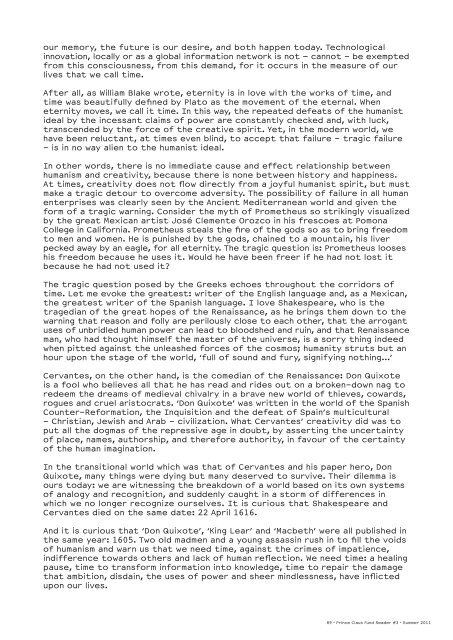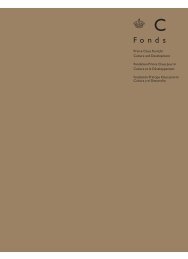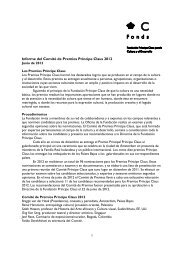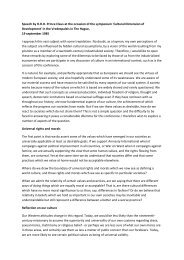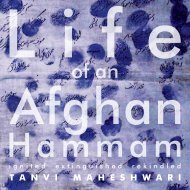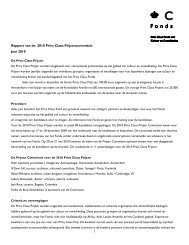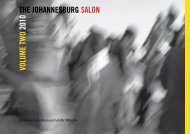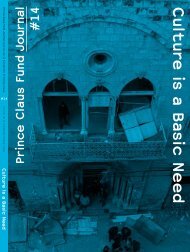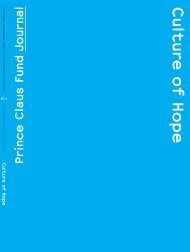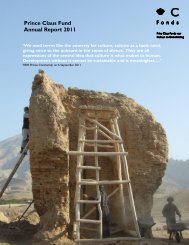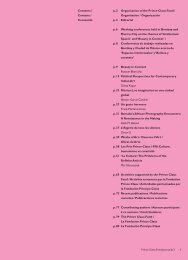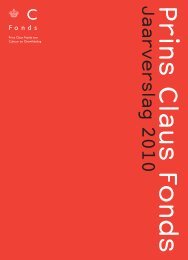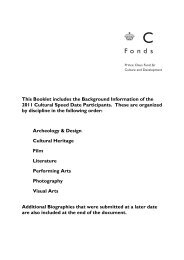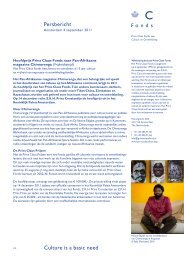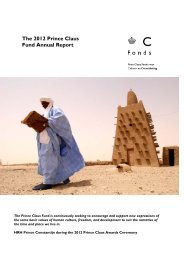3 summer 2011 - Prince Claus Fund
3 summer 2011 - Prince Claus Fund
3 summer 2011 - Prince Claus Fund
- No tags were found...
Create successful ePaper yourself
Turn your PDF publications into a flip-book with our unique Google optimized e-Paper software.
our memory, the future is our desire, and both happen today. Technologicalinnovation, locally or as a global information network is not – cannot - be exemptedfrom this consciousness, from this demand, for it occurs in the measure of ourlives that we call time.After all, as William Blake wrote, eternity is in love with the works of time, andtime was beautifully defined by Plato as the movement of the eternal. Wheneternity moves, we call it time. In this way, the repeated defeats of the humanistideal by the incessant claims of power are constantly checked and, with luck,transcended by the force of the creative spirit. Yet, in the modern world, wehave been reluctant, at times even blind, to accept that failure - tragic failure- is in no way alien to the humanist ideal.In other words, there is no immediate cause and effect relationship betweenhumanism and creativity, because there is none between history and happiness.At times, creativity does not flow directly from a joyful humanist spirit, but mustmake a tragic detour to overcome adversity. The possibility of failure in all humanenterprises was clearly seen by the Ancient Mediterranean world and given theform of a tragic warning. Consider the myth of Prometheus so strikingly visualizedby the great Mexican artist José Clemente Orozco in his frescoes at PomonaCollege in California. Prometheus steals the fire of the gods so as to bring freedomto men and women. He is punished by the gods, chained to a mountain, his liverpecked away by an eagle, for all eternity. The tragic question is: Prometheus looseshis freedom because he uses it. Would he have been freer if he had not lost itbecause he had not used it?The tragic question posed by the Greeks echoes throughout the corridors oftime. Let me evoke the greatest: writer of the English language and, as a Mexican,the greatest writer of the Spanish language. I love Shakespeare, who is thetragedian of the great hopes of the Renaissance, as he brings them down to thewarning that reason and folly are perilously close to each other, that the arrogantuses of unbridled human power can lead to bloodshed and ruin, and that Renaissanceman, who had thought himself the master of the universe, is a sorry thing indeedwhen pitted against the unleashed forces of the cosmos; humanity struts but anhour upon the stage of the world, ‘full of sound and fury, signifying nothing...’Cervantes, on the other hand, is the comedian of the Renaissance: Don Quixoteis a fool who believes all that he has read and rides out on a broken-down nag toredeem the dreams of medieval chivalry in a brave new world of thieves, cowards,rogues and cruel aristocrats. ‘Don Quixote’ was written in the world of the SpanishCounter-Reformation, the Inquisition and the defeat of Spain’s multicultural- Christian, Jewish and Arab - civilization. What Cervantes’ creativity did was toput all the dogmas of the repressive age in doubt, by asserting the uncertaintyof place, names, authorship, and therefore authority, in favour of the certaintyof the human imagination.In the transitional world which was that of Cervantes and his paper hero, DonQuixote, many things were dying but many deserved to survive. Their dilemma isours today: we are witnessing the breakdown of a world based on its own systemsof analogy and recognition, and suddenly caught in a storm of differences inwhich we no longer recognize ourselves. It is curious that Shakespeare andCervantes died on the same date: 22 April 1616.And it is curious that ‘Don Quixote’, ‘King Lear’ and ‘Macbeth’ were all published inthe same year: 1605. Two old madmen and a young assassin rush in to fill the voidsof humanism and warn us that we need time, against the crimes of impatience,indifference towards others and lack of human reflection. We need time: a healingpause, time to transform information into knowledge, time to repair the damagethat ambition, disdain, the uses of power and sheer mindlessness, have inflictedupon our lives.89 · <strong>Prince</strong> <strong>Claus</strong> <strong>Fund</strong> Reader #3 · Summer <strong>2011</strong>


